BANKSTOWN CANCER CENTRE
Our VisionA Centre for multidisciplinary cancer treatment and research. Providing excellence in service and care for patients and their families throughout their cancer journey. MissionThe aim of our Centre is to care for you throughout your cancer journey, providing a holistic approach to your cancer management that places you the patient, and your family first through the collaboration of a comprehensive multidisciplinary team. Bankstown Cancer Centre provides comprehensive Medical Oncology, Radiation Oncology, Palliative Care and Haematology consultative services, as well as providing Chemotherapy treatments and Allied Health services. Integrated multidisciplinary teams specialise in specific tumour groups, including Breast, Gynaecology, Haematology, Head and Neck, Genito-Urinary, Lung, Colorectal, Upper and Lower Gastro-Intestinal and Neurological cancers. The Cancer Centre is located on level 2, which is the main entrance level to the Hospital. Access to the centre is gained via the door marked Cancer Centre. Hours of operation are from 8:00am-5:00pm Monday to Friday excluding Public Holidays.
TransportClick to access Transport Information ParkingParking is provided within meters of the hospital entrance providing safety for patients and their carers. When attending the Cancer Centre patients can apply for a discounted parking pass for use during the course of their treatment. For more information please talk to the staff in the Cancer Centre. Multidisciplinary CareThe multidisciplinary team comprises of Medical Oncologists, Haematologists, Radiation Oncologists, Surgical Oncologists, and a Palliative Care Physician, specialist nurses, social worker, clinical psychologist, and dietitian. Should you require other support services, such as Occupational Therapy, Speech Pathology and Physiotherapy, these services are not part of the Cancer Centre but are provided through the Hospital. The multidisciplinary team meets regularly in order to provide the best possible holistic approach in the delivery of every patient's care. Oncologists are doctors who specialise in cancer treatment. They work with patients and the rest of the health care team to determine the best treatment plan and monitor side effects.
We also have a dedicated team of friendly volunteers who are there to help you, your family and friends in any way they can. There is a social worker on site to assist with practical issues such as transport, financial and legal matters accommodation and accessing community and government support. Supportive counselling is also provided by this service. In order to assist you through this difficult time and help you and your family a Clinical Psychologist can provide counselling and relaxation strategies for those experiencing anxiety, distress, panic, depression or other issues related to living with Cancer. Chemotherapy can cause weight loss and loss of appetite, a dietitian is available to assess your nutritional needs and provide nutritional support as required. This service is ongoing during your cancer treatment. A Clinical Nurse Consultant in Palliative Care is available to assist with symptoms associated with your illness. Should you require more complex interventions you may be referred to the Palliative Care Physician.
Clerical staff will assist you in making appointments for tests that are done outside the Cancer Centre and will make follow up appointments for you to see your Specialist as required. Should there be a problem with any of your appointments please do not hesitate to contact the Clerical Staff as necessary.
If you experience any problems during your treatment please contact the nurses in the Chemotherapy Suite. You will be seen by your Specialist prior to each cycle of chemotherapy to monitor your progress.
Interpreter Services are available for most languages. We prefer to use professional interpreters as they are trained in interpreting medical terminology. Relatives are welcome to attend appointments. Education and Support Programs are run on a regular basis through the Cancer Centre. Programs include Look Good Feel Better for both men and women, Living with Cancer Programs in various languages, and a Men's Cancer Support Group. Please speak with the Social Worker or Nursing Staff if you are interested in attending, as programs may change depending on the need of the patients. What is Chemotherapy?Chemotherapy agents are used as one type of treatment for Cancer. Chemotherapy can be administered in a number of ways, however the primary route of administration in the Chemotherapy suite is intravenous, into the vein. There are many varied types of cancer and because of this not all people will receive the exact same type of Chemotherapy. Through clinical trials it has been identified that certain types of Cancer respond better to different types of Chemotherapy. Simply defined, Chemotherapy is an agent that is given with the intention of stopping cell growth. Cancer cells and normal healthy cells are affected by Chemotherapy as the agents used are unable to differentiate between healthy and malignant cells. What are the side effects? How can they be reduced?Not all chemotherapy drugs cause the same side effects, and some may have very few. Cancer treatments produce different reactions in different people and any reaction can vary from treatment to treatment. It may be helpful to remember that almost all side effects are only short term and will gradually disappear once the treatment has stopped. The main areas of your body that may be affected by chemotherapy are those where normal cells rapidly divide and grow, such as your mouth, digestive system, skin, hair and bone marrow (the spongy material that fills the bones and produces new blood cells). The changes in your blood will be monitored by regular blood tests. One of the more visible side effects may be hair loss, whether treatments will cause hair loss differs with the individual chemotherapy drugs. The Cancer Centre provides access to wig services and also the 'Look Good Feel Better' program which assists with appearance changes associated with the treatment of Chemotherapy. Infections and Fevers The body's immune system can be affected by chemotherapy. This makes you prone to infections and fevers. When starting chemotherapy nursing staff will give you a medical alert card to use, should you experience high temperatures(38°C and above). It is important to seek immediate medical attention by presenting to the Cancer centre or nearest Emergency Department. Nausea and Vomiting You will receive medication before the chemotherapy to reduce the chances of nausea and/or vomiting. You will also be given tablets and maybe suppositories to use if you feeling nauseated or are vomiting after treatment. Eat small meals, drink plenty of fluid and avoid spicy, fatty foods. Our dietitian can help. Mouth Ulcers To prevent mouth ulcers occurring it is important to maintain good oral hygiene. This includes brushing your teeth with a soft toothbrush and rinsing your mouth with Bicarbonate Soda (baking soda) regularly. Constipation Various chemotherapies may cause constipation. It is important to prevent this from happening. Changing your diet to include fruits, vegetable and fibre as well as drinking plenty of fluids can help. Medications may also be used to help relieve constipation, please seek advice from nursing and medical staff for the most appropriate treatment for you. Diarrhoea
Hair Loss Not all chemotherapy causes hair loss. The nursing and medical staff will inform you if your treatment will cause hair thinning or total hair loss.You may lose hair from your head, but also eyebrows, eyelashes and other body hair. You can use make-up to help, our Look Good Feel Better program will tell you how. The hair will grow back when the chemotherapy stops. Further InformationFor further information regarding your chemotherapy treatment and management of side effects, please speak with one of our specialist nurses who will advise you how to best manage your symptoms. The Cancer Institute website is easily accessible providing comprehensive information regarding various cancer types and treatments: www.cancerinstitute.org.au Clinical Trials
Click to view Clinical Trial
Database Table |



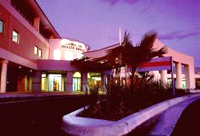 The Bankstown Cancer Centre hosts consultative services with
specialists in Medical oncology, Gynaecological Oncology,
Haematology, Radiation Oncology and Palliative Care. Chemotherapy
treatments are available in an outpatient setting at the Bankstown
Cancer Centre.
The Bankstown Cancer Centre hosts consultative services with
specialists in Medical oncology, Gynaecological Oncology,
Haematology, Radiation Oncology and Palliative Care. Chemotherapy
treatments are available in an outpatient setting at the Bankstown
Cancer Centre.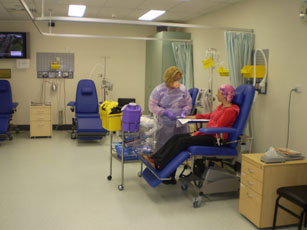 Oncology Nurses are registered nurses who specialise in cancer:
Oncology Nurses are registered nurses who specialise in cancer:
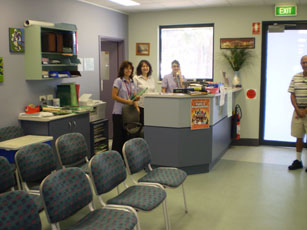 You may be referred to other
support services as required, such as
Occupation Therapy, Speech Pathology, and Physiotherapy. Although
these services are not part of the Cancer Centre they are provided
through the Hospital.
You may be referred to other
support services as required, such as
Occupation Therapy, Speech Pathology, and Physiotherapy. Although
these services are not part of the Cancer Centre they are provided
through the Hospital.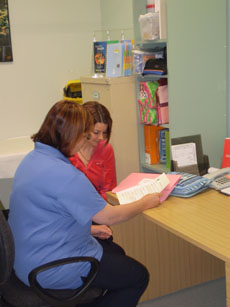 Should you require
chemotherapy you will be seen by one of our
specialist nurses who will give you written information, and explain
what to expect and how to care for yourself during your treatment.
Should you require
chemotherapy you will be seen by one of our
specialist nurses who will give you written information, and explain
what to expect and how to care for yourself during your treatment.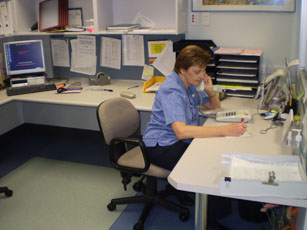 Pharmacist delivers the chemotherapy to the unit each day. A
Pharmacist is available to discuss treatment regimens and to ensure
all treatment modes are compatible.
Pharmacist delivers the chemotherapy to the unit each day. A
Pharmacist is available to discuss treatment regimens and to ensure
all treatment modes are compatible.
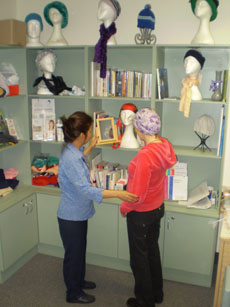 You may experience diarrhoea as a side effect of your chemotherapy
treatment. Please seek advice from the nursing or medical staff on
how to best manage this. It is important to seek medical attention
if the diarrhoea persists despite treatment.
You may experience diarrhoea as a side effect of your chemotherapy
treatment. Please seek advice from the nursing or medical staff on
how to best manage this. It is important to seek medical attention
if the diarrhoea persists despite treatment.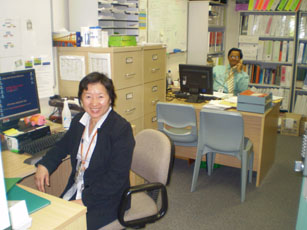 Clinical Trials are conducted in order to develop new treatments for
cancer to improve outcomes for this disease. Bankstown Hospital
participates in Clinical Trials, should you be eligible to
participate in a Clinical Trial you will be seen by our Clinical
Trials Staff.
Clinical Trials are conducted in order to develop new treatments for
cancer to improve outcomes for this disease. Bankstown Hospital
participates in Clinical Trials, should you be eligible to
participate in a Clinical Trial you will be seen by our Clinical
Trials Staff.